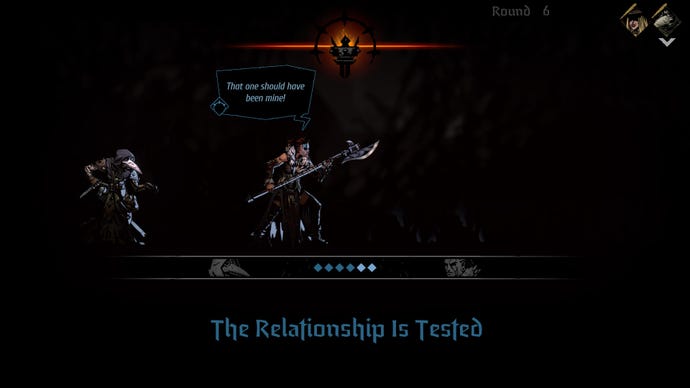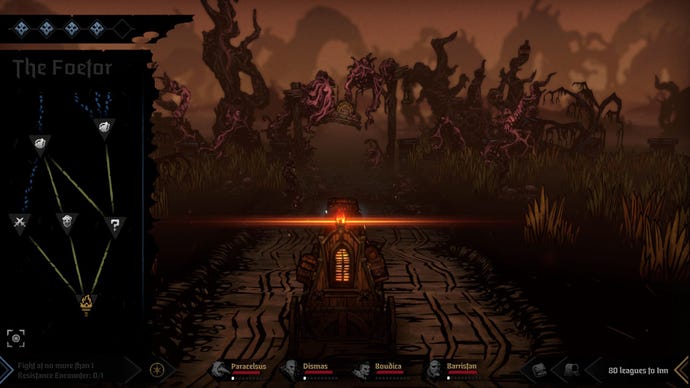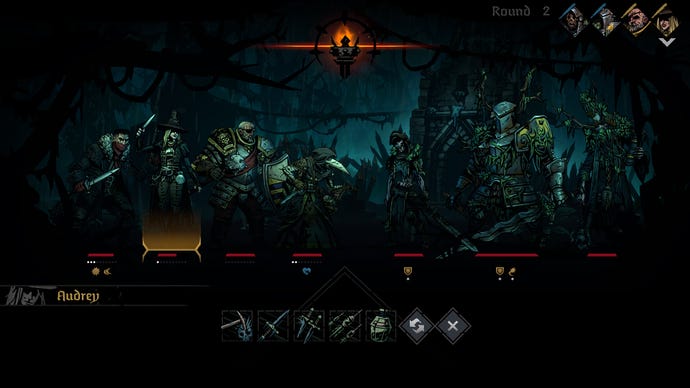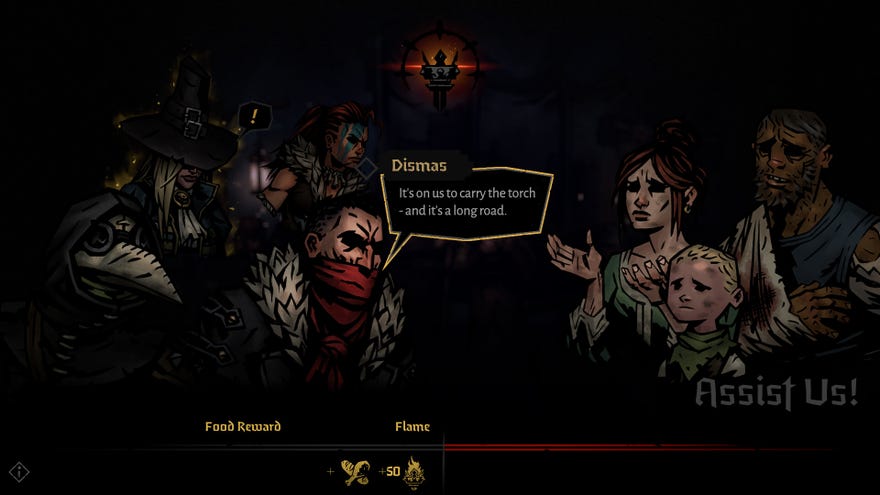Darkest Dungeon 2 developers wanted to make a sequel that "didn't sabotage its older brother"
"It was important to us that if we did another game it needed to feel audacious in its own way"
Darkest Dungeon 2, the sequel to Red Hook Studio's gothic roguelike, is a somewhat familiar affair. It's dark, it's tough, and a narrator likes to remind you of those things frequently. But this time around, we're leaving the Ancestor's squalid hamlet behind, and swapping it out for a stress-fueled stagecoach. Heroes are no longer cannon-fodder to send out on doomed expeditions, but vital team members who have stories to share and relationships to forge.
I recently talked with creative director Chris Bourassa and design director Tyler Sigman about why they decided to take the game in this new direction, the difficulties of switching to a relationship-based affliction system, and why they're excited to be working in early access again.
The developers tell me that, while the idea behind DD1 was to have players descending into a dreary pit of doom and gloom, DD2 sees them trying to lift a ragtag group of heroes out of that darkness to stop an apocalypse (though they'll still face their fair share of doom on the journey). The sequel doesn't follow the strange tale of the Ancestor, but instead focuses on the heroes themselves, letting you learn about each of their lives, and watch (and occasionally intervene) as they form bonds with the other characters (be those good or bad).
The new focus on relationships came about because Bourassa and Sigman saw how much players were excited by DD1's characters. They knew there was more to explore with them, and didn't want to make a sequel that followed the original's formula so closely that they wouldn't break any new ground as developers.
"We felt that, although people may express that they want more of the same, ultimately it won't give them the same feeling that the first game did," Bourassa tells me. "All of these pivots, from design to presentation, were born of a desire to create something fresh and impactful that stands on its own, and doesn't try to sabotage its older brother."
"There was a little bit of risk of, if we direct sequel it in the most obvious way, it could just feel like a big DLC," Sigman adds. "That's not necessarily bad, but we were really lucky with Darkest Dungeon in that we tried to do something a little bit audacious and it worked, so it was important to us that if we did another game that it needed to feel audacious in its own way too."
"You're all on the same journey for genuine redemption and a loop-breaking experience"
Bourassa tells me that they approached this game from the other side of the coin to DD1. Players are used to narration being focused on the origins of that games' bosses, and how awful the Ancestor really was, "It's just a step by step descent into nihilism and awfulness." A game about crawling up out of that needed to focus on the heroes, and the things they've done that they're trying to move past.
"You're all on the same journey for genuine redemption and a loop-breaking experience," Bourassa says. "Because that's what a roguelike is, you're stuck in a loop forever. That's how the first game ends. So really, this game is about breaking out of a loop."
"You can't break out of the loop until 1.0 launches," he quickly adds. "But in about a year you can start breaking out of the loop [laughs]."
I'm told that the development of these relationships was a natural extension of the affliction system in DD1. The characters used to be a means to an end, so stress mostly affected just the one hero. But with DD2's new affinity system, characters can become fast friends, or faster enemies, depending on how they react to each other's decisions. This often leads to a lot of bickering.
"I can fall on the sword here a little bit and say this is what early access is really great for, balance," Sigman says. It's a complaint they jumped straight on top of - the day after launch, they updated it to tone down how often heroes interrupted with their arguments. They still butt heads a lot mind you, but I've found it a lot better than it was.

Sigman adds that, while there is some "trademark Red Hook randomness", there is a logic to guiding these relationships. You're supposed to be able to game them, to an extent. If someone's on Death's Door, for example, and you heal another character, you can expect the dying person to be a bit pissed. If you come to an intersection where you decide to go in a direction your heroes don't want to, then they're gonna get stressed.
"You can never totally control everything, because just like the first one, the heroes can do stuff on their own, that's an important part of it," Sigman says. "You can't always appease everyone, but you can understand the mechanics at work, rather than it being completely random."
"Stick four people in a car, and a road trip is as much about the relationships of the people jamming in there as it is about the scenery and the destinations"
"The higher stress they are, the more irritable they are," Bourassa adds. "So you could be developing a positive affinity towards one character but as soon as they get stressed they start eating away at it and being really snide and shitty. And I love that because that's exactly what we were after, where the mounting pressure starts eroding everybody's civility."
Sometimes it very much feels like babysitting a bunch of petulant kids on a long road trip, and that's actually kind of the point.
"After I graduated university, four of my friends took a road trip from Nova Scotia to Alaska, and two of them were together, and the other two were just pals," Bourassa tells me. "By the time they got to Alaska, the couple that had been together had broken up, cheated on each other - I think twice - with different configurations of the group.
"In the back of my mind, I thought: if we can just deliver on four entitled, kind of rotten people in the back of a wagon, like four kids in the back of a car, I feel like that could be a really great game. And you get to be the stressed out parent in that situation."
"You stick four people in a car, and a road trip is as much about the relationships of the people jamming in there as it is about the scenery and the destinations," Sigman adds. "Put that against the fate of the world, and you get some really interesting stuff."

For me, the Darkest Dungeon 2 feels more strategic. Not only with how you have to balance these relationships, but in regards to where you choose to take your quarrelsome charges too. The map is reminiscent of Slay The Spire, where you get to choose your route through whatever grim biome you're in. Like DD1, you have a torch that plays a very important role as well, and it's often wise to choose events you know will give you a little more light. However, the developers tell me the torch is more allegorical than literal this time around.
"It's really about being a beacon of hope," Bourassa explains. "But choosing torchlight means you have to go without something else. You're constantly balancing how helpful you're being vs how many combats you're engaged in. It requires a steady management because it really is your run's health bar, in a sense."
"We're asking you to stick with that party for hours to win a run, instead of 30 minutes to clear a dungeon"
For me, it can be tempting to avoid the places that give you more torchlight, purely because there's loot to be had after most combat encounters. Some of those have multiple rounds too, enticing you to try just one more wave of enemies to get something really special. Personally, this has often ended poorly. Overconfidence is a slow and insidious killer, after all.
"It's not that we want you to always suffer from your hubris," Sigman tells me. "It's more like, if you don't suffer a little, there are times when you take the risk and win and it doesn't always feel great."
Find yourself a good combination of characters though, and taking on those tougher fights can be very rewarding. Battles are turn-based liked DD1, albeit with 3D art now. But because the game asks you to create a party to go all the way through the campaign, rather than just for one specific biome, you have a little more freedom with how you use them. Red Hook tell me none of the characters are designed to be fully dedicated healers because they don't want to force players into bringing one every time (that said, I'm wary of venturing anywhere without the Plague Doctor). Instead, it's supposed to be about strategising with what you have. Each hero has 11 possible skills, and you can juggle which ones are active while you're on the road to prep for whatever encounter you're aiming for next.
"From a pure mechanical perspective, we had to enable them to be more versatile," Sigman says. "Versatility and creativity within your party construction is really important to us, and maybe even more vital in this game since we're asking you to stick with that party for hours to win a run, instead of 30 minutes to clear a dungeon."

As if on cue, we're briefly interrupted by a round of cheering just off camera at the studio Bourassa is calling in from. Turns out some of the Red Hook team had been watching a DD2 stream where someone had managed to kill a boss. It sounds like they managed to perfect a combo, which is pretty vital feedback for the Red Hook folks.
"It's one of the huge advantages of suddenly having all of these players," Sigman tells me. "This feedback is exciting because we can shape what we have in the game already to continue to improve it, and also make more content.
"We were fortunate to have a ton of success out of DD1, but we never assume success and it took us a long time to get there, and it succeeded beyond our wildest dreams. There's definitely been times during development where you're in the dark and hoping you're pointing north, and this is really exciting to see it all come together. We're really proud of the team. It's pretty thrilling to release again."
Darkest Dungeon 2 is out in early access on the Epic Games Store right now. It'll stay in early access for about a year, while the devs add new biomes, heroes, modding support, as well as "lots of monsters and awful stuff". Red Hook have said exclusivity is only for early access.


